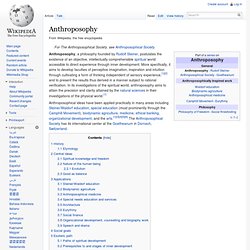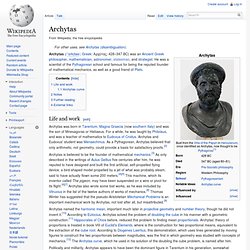

Hédonisme. Eusèbe de Césarée. Alain de Botton. Anthroposophy. Anthroposophy, a philosophy founded by Rudolf Steiner, postulates the existence of an objective, intellectually comprehensible spiritual world accessible to direct experience through inner development.

More specifically, it aims to develop faculties of perceptive imagination, inspiration and intuition through cultivating a form of thinking independent of sensory experience,[1][2] and to present the results thus derived in a manner subject to rational verification. In its investigations of the spiritual world, anthroposophy aims to attain the precision and clarity attained by the natural sciences in their investigations of the physical world.[1] History[edit] The early work of the founder of anthroposophy, Rudolf Steiner, culminated in his Philosophy of Freedom (also translated as The Philosophy of Spiritual Activity and Intuitive Thinking as a Spiritual Path).
Archytas. Archytas (/ˈɑrkɪtəs/; Greek: Ἀρχύτας; 428–347 BC) was an Ancient Greek philosopher, mathematician, astronomer, statesman, and strategist.

He was a scientist of the Pythagorean school and famous for being the reputed founder of mathematical mechanics, as well as a good friend of Plato. Life and work[edit] Archytas was born in Tarentum, Magna Graecia (now southern Italy) and was the son of Mnesagoras or Histiaeus. For a while, he was taught by Philolaus, and was a teacher of mathematics to Eudoxus of Cnidus. Archytas and Eudoxus' student was Menaechmus.